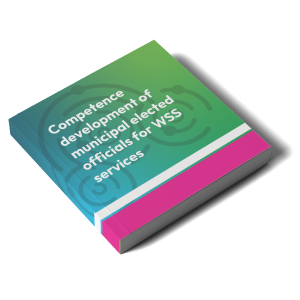Competence development of municipal elected officials for WSS services
Module 1 and Module 2
Module 1
 Overall learning outcome:
Overall learning outcome:
To underline legal obligations of municipal elected officials for provision of quality WSS services and efficient organization of water services at the local level.
Specific learning outcomes:
- Participants are familiarised with LGU legal and institutional framework in water services sector and better understand their roles and responsibilities;
- Participants understand the importance of and need for improving the organisation of water service delivery at the LGU level;
- Participants develop their competences jointly hence ensuring collaborative approach to organisation and delivery of water
Primary target group:
- LGU decision makers (mayors, speakers, councillors)
Secondary target group:
- Staff of LGU departments responsible for communal affairs (water services)
- PUC top and middle management
- PUC assembly and supervisory board members
- Promotion and selling staff from LGAs and APUCs
- Line ministries, regulators
Key topics:
General Aspects of Water Services
- Jurisdiction, Rights and Obligations,
- Organization of delivery of water services at the local level,
- Water services in urban and rural areas,
- Public Service Agreement (PSA) / Contract,
- Roles and Responsibilities at LGU’s level (LGU’s council, Mayor and departments, Public Utility Companies (PUCs), Customers)
- Strategic and business planning,
- Water quantity and water quality, including sanitary protection zones,
- Sustainability in provision of water services by PUCs.
Integrated Asset Management
- Legal framework in managing the assets at the LGU level,
- Ownership on infrastructure assets (water and wastewater infrastructure),
- Level of Service (LoS),
- Organization of Asset Management (AM) at the level of LGUs and PUCs,
- Roles and responsibilities in managing assets at the level of LGUs and PUCs (link to PSA),
- AM procedures at the level of LGUs and PUCs,
- Communication and coordination of AM activities between LGUs and PUCs.
Capital infrastructure investments
- Basics of Project Cycle Management (PCM),
- Preparation,
- Requirements from IFIs and donors,
- Implementation,
- Operation and Maintenance.
Water Services Management
- Human Resources Management,
- Customer Relationship,
- Non-Revenue Water Management,
- Performance of PUCs.
Tariff policy
- The tariff methodology,
- The main principles for the tariff setting,
- Key issues regarding the tariff structure,
- Explanation of the affordability principle,
- The needs for subsidy programmes for socially vulnerable groups.
Duration: 1 day
Module 2
 Overall learning outcome:
Overall learning outcome:
To enhance capacities of LGU employees to fulfil legally defined LGU responsibilities for delivering quality water supply and wastewater collection and treatment services to citizens.
Specific learning outcomes:
- Participants understand how to organise efficient and sustainable water service provision at the LGU level;
- Participants are familiarised with importance of good human resource management, asset management as well as infrastructure financing and implementation practices;
- Participants develop their competences necessary for achieving operational and financial efficiency of LGUs and their PUCs in the WSS sector.
Target group:
- Staff of LGU departments responsible for communal affairs (water services)
Key topics:
Organisation of Water Service Delivery
- Jurisdiction, rights and obligations, roles and responsibilities in the WSS sector
- Organization of delivery of water services at the local level,
- Public Service Agreement (PSA) / Contract,
- Key performance indicators,
- Customer relations,
- Strategic and business planning,
- Water quantity and water quality,
- Sustainability in provision of water services by PUCs.
Human Resource Management
- Mission, strategic planning, goals, functions,
- Organisational structure,
- Job description,
- Workplace rationalisation and optimisation of work process.
Integrated Asset Management
- Capital asset management,
- What is IAM and its outcomes, purpose and benefits,
- Getting started in IAM planning and change in business culture.
Water Service Financing
- Cost management,
- Human resource management,
- Non-revenue water management and asset management,
- Capital infrastructure financing,
- Finance management,
- Cost-recovery tariff and tariff structure.
Capital Investment Management
- Implementation of the water infrastructure construction projects,
- Role of Project Implementation Unit and Consultant,
- Use of internationally recognized standard contract conditions,
- Designing and permitting process,
- Terms of Reference.
Duration: 2 days
